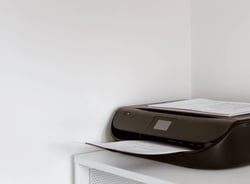Despite the rise of virtualization and cloud computing, there is still a need for offices to maintain onsite equipment – like computers and printers. Even though reports, spreadsheets and other data can be shared via email, PowerPoint and the cloud, there is still a great need in most companies to be able to put documents and data on paper.
Although the cloud significantly reduces much of the hardware needed to maintain large data centers, servers and network systems onsite, you’ll still need printers. The age old decision you’ll face as a small business owner or IT department manager is: inkjet vs. laser printers.
What are the benefits and drawbacks of each? Which is more flexible and capable of adapting with your business? What about the cost involved, both short and long-term, with each printer? Taking all of these elements into consideration will make your decision simple.
Basics of Inkjet Printers
 The inkjet printer has long been a staple in homes across the country and has been useful in certain circumstances within business. Where the inkjet printer excels is in simplicity and color quality. Inkjet printers are relatively easy to setup and maintain, not to mention the fact that they tend to take up less space.
The inkjet printer has long been a staple in homes across the country and has been useful in certain circumstances within business. Where the inkjet printer excels is in simplicity and color quality. Inkjet printers are relatively easy to setup and maintain, not to mention the fact that they tend to take up less space.
For businesses printing small batches of photos or using a variety of different media to print on, inkjets might be a good choice. Because inkjet printers mix liquid ink to create color palates, they tend to deliver a better photo quality with richer colors. Inkjets are also capable of working with a variety of media such as cotton, textured stationery, coated fabrics and even canvas. (In these circumstances it is wise to compare your cost to produce against the cost of outsourcing these projects; depending on the nature of and quantities needed for your project, outsourcing to a print shop may be more cost-effective than investing in the necessary supplies for on-site production.)
The advantages of inkjet for business purposes end there though. Even the best inkjet models can only handle up to about 150 sheets of paper in the input tray and most have a flimsy plastic extension arm for an output tray. Additionally, inkjet printers are incapable of the typical speed, quality and cost-effectiveness necessary for standard business printing.
Basics of a Laser Printer
 The laser printer is hands down the champion for use in business offices. Simply put, a laser printer is more efficient, operates faster and can handle higher quantities than an inkjet printer. First and foremost, if your business relies upon clear and concise newsletters, media guides and other printed documents, you’ll want a laser printer.
The laser printer is hands down the champion for use in business offices. Simply put, a laser printer is more efficient, operates faster and can handle higher quantities than an inkjet printer. First and foremost, if your business relies upon clear and concise newsletters, media guides and other printed documents, you’ll want a laser printer.
Laser printers can quickly and accurately print black text, colored text and simple graphics. On average, a laser printer produces quality results 50% faster than inkjet printers. On top of that speed, laser printers can handle a much greater volume than their inkjet alternatives. The average laser printer has a minimum input tray capacity of 150 sheets of paper. More advanced models can accommodate up to 250 sheets and also offer secondary input trays to increase output.
Some laser printer models are capable of handling limited variety in materials (i.e. labels, envelopes, cardstock), but not to the extent of inkjet printers. Standard 20 lb. office paper is the ideal material for laser printers.
Inkjet vs. Laser Printers: The Decision
Regardless of the size of your business, a laser printer is the way to go. The speed, quality and capacity of laser printing make it more efficient for use in any office environment. For many businesses, a multifunction laser printer is the best alternative because necessary technologies are combined into one piece of equipment. You are able to conserve space while having access to scanning, copying, faxing and printing capabilities.
Managed Print Service (MPS) providers can help your business determine your specific printing needs and identify the printer hardware and services that will give your business the speed and flexibility it needs. See how companies are benefitting from the services MPS providers offer:
